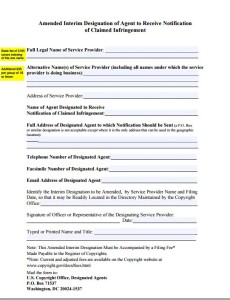DMCA 512(c) Formalities Strike Again–BWP v. Hollywood Fan Sites

Have you amended your “Interim Designation of Agent to Receive Notification
of Claimed Infringement” today?
Defendant #1 can show that its earliest agent designation was filed on November 5, 2012. The complaint alleges infringement starting March 17, 2011. Without an operative filing before Nov. 5, 2012, the court says the 512(c) safe harbor does not apply to any infringement before then.
Defendant #2 alleges that it was covered by a 2008 filing made by its parent company. However, even though the parent company submitted a declaration that it made the filing “on behalf of itself and its subsidiaries and affiliates,” the actual filing never referenced the defendant #2 in either the filer’s name or alternate names. Furthermore, the court says it’s also irrelevant if defendant #2 made the requisite disclosures about its agent on its website because the safe harbor:
contemplates two parallel sources—the provider’s website and the USCO directory—where each service provider’s DMCA agent information is readily available to the public. For a service provider to fulfill only one of these two requirements is insufficient.
Thus, the Copyright Office agent designation and website disclosure of the agent’s contact info are two independent prerequisites for the 512(c) safe harbor, even though they may (and should) contain identical information. Defendant #2 made its first independent Copyright Office filing Dec. 5, 2013, and it’s ineligible for the 512(c) safe harbor before that.
There’s nothing surprising about these conclusions. As I’ve repeatedly lamented, 512(c) has over a dozen independent prerequisites for the safe harbor, and defendant must satisfy each and every one of them to obtain the safe harbor.
So the main reason why I’m blogging this unsurprising ruling is to encourage you to STOP READING THIS BLOG POST RIGHT NOW and GO DOUBLECHECK THAT YOUR AGENT DESIGNATIONS AT THE COPYRIGHT OFFICE ARE CURRENT AND COMPLETE. Making proper agent designations in the Copyright Office filing doesn’t ensure the availability of 512(c), but failing to make the proper filing ensures 512(c) won’t be available. So even if you’re 100% sure you made the filing perfectly originally, why not take a few moments to see if anything might have changed?
This ruling also reminds me that, four years later, we haven’t more about the Copyright Office’s terrible proposal to automatically purge the agency registry periodically, which nominally would improve the database’s accuracy but mostly would cause lots of well-meaning service providers to inadvertently lose the 512(c) safe harbor. Seeing this case’s result–where the defendant obviously tried to do the right thing but didn’t get still didn’t get the formalities right–reminds us how pernicious the Copyright Office’s proposal was.
Case citation: BWP Media USA, Inc. v. Hollywood Fan Sites LLC, 2015 WL 3971750 (SDNY June 30, 2015)
